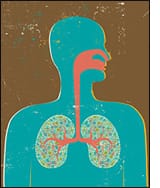The Department of Health has recently issued a statement addressing the concerning rise in respiratory illnesses, forecasting an increase in cases as the colder months approach. This announcement comes amid a backdrop of heightened awareness regarding public health, particularly in the wake of the COVID-19 pandemic, which has underscored the importance of respiratory health.
Health officials have noted that respiratory illnesses, which include conditions such as influenza, pneumonia, and bronchitis, tend to spike during the fall and winter seasons. Factors contributing to this seasonal uptick include colder temperatures, increased indoor gatherings, and the circulation of various respiratory viruses. The Department of Health emphasizes the need for public awareness and preparedness as these factors converge to create an environment conducive to the spread of respiratory illnesses.
One of the primary concerns highlighted by health authorities is the potential overlap of respiratory illnesses with other viral infections. The circulation of viruses such as the influenza virus and respiratory syncytial virus (RSV) can lead to a compounded effect on public health. The Department of Health is particularly focused on vulnerable populations, including young children, the elderly, and individuals with pre-existing health conditions, who are at greater risk for severe complications from respiratory illnesses.
In light of these predictions, the Department of Health is advocating for proactive measures to mitigate the spread of respiratory illnesses. Public health campaigns are being launched to educate individuals on the importance of vaccination, particularly against influenza and COVID-19. Health officials are encouraging everyone to stay up to date with their vaccinations, as this is one of the most effective ways to protect against severe illness.
In addition to vaccination, the Department of Health is promoting other preventive measures. Frequent handwashing, the use of hand sanitizers, and practicing good respiratory hygiene—such as covering one’s mouth and nose when coughing or sneezing—are being emphasized as essential practices to reduce transmission. Moreover, individuals are encouraged to stay home when feeling unwell to prevent the spread of illnesses to others.
The Department of Health is also closely monitoring healthcare systems to ensure they are prepared for the anticipated increase in respiratory illness cases. Hospitals and clinics are being advised to bolster their resources, including staffing and supplies, to handle a potential surge in patients. This preparation is crucial to maintaining the quality of care and ensuring that individuals receive timely medical attention when needed.
Furthermore, the Department is collaborating with community organizations and healthcare providers to disseminate information and resources. By fostering a collaborative approach, the Department aims to create a comprehensive strategy that addresses the multifaceted challenges posed by respiratory illnesses. This includes not only immediate health concerns but also long-term strategies for improving respiratory health outcomes in the community.
The Department of Health is also aware of the potential impact of misinformation regarding respiratory illnesses. In an era of rapid information dissemination, it is critical to provide accurate and reliable information to the public. The Department is committed to countering misinformation by providing clear guidelines and updates regarding respiratory health and the measures individuals can take to protect themselves and their families.
As the situation evolves, the Department of Health will continue to monitor trends in respiratory illnesses and adjust its public health strategies accordingly. Regular updates will be provided to keep the public informed of any changes in recommendations or guidance as new data becomes available.
In conclusion, the Department of Health’s announcement regarding the expected rise in respiratory illnesses serves as a timely reminder of the importance of public health vigilance. With the right preventive measures and community cooperation, it is possible to mitigate the impact of respiratory illnesses and safeguard the health of the population. As individuals prepare for the upcoming months, staying informed and taking proactive steps will be essential in navigating the challenges ahead.



